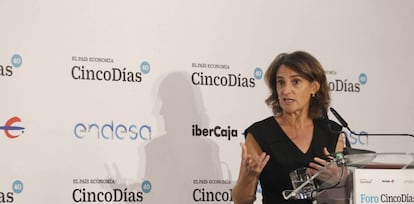Spanish government adds more experts to task force preparing deescalation of confinement measures
The group is working on the assumption that changes to the situation will have to be introduced from April 26, when the current state of alarm ends

The Spanish government is currently working at at least three different speeds to combat the coronavirus crisis. One is the here and now, and which involves practically the entire executive, with the four key ministries – Health, Interior, Transportation and Defense – in charge, taking decisions every day to try to control the health emergency and palliate the effects it is having on the economy.
The other, the long term, which includes economic and social reconstruction, is being worked on by the Finance Ministry. Their remit includes getting the 2021 budget passed by Congress, something that will require the support of other parties given that the Socialist Party-Unidas Podemos coalition government does not have a working majority. And a third group, working away from the spotlight, is focused on the medium term, and how the deescalation of confinement measures will be carried out.
The group includes a wide range of technical experts of all kinds, not just epidemiologists and economists
This group is being coordinated by Teresa Ribera, one of Spain’s deputy prime ministers and also the minister for environmental transition. Health Minister Salvador Illa is participating in the group, given his constant contact with scientific experts and the regional health chiefs.
The task force is meeting on a very discreet basis, with some ministers who are outside of the central core of those managing the crisis, such as Foreign Minister Arancha González Laya, who is in permanent contact with her counterparts in the other countries affected by the coronavirus pandemic, and who provides information about the measures being taken elsewhere. It also includes José Luis Escrivá, the social security minister and a renowned economist, who is providing a technical vision.
As well as politicians, the group includes a wide range of technical experts of all kinds, not just epidemiologists and economists. This committee will be making proposals to Prime Minister Pedro Sánchez as to the measures that should be taken when the deescalation of the confinement begins. Sources from the executive explain that this will be a particularly complex phase, and extreme care is being taken.
They are working on the assumption that it is essential to begin thinking about these measures so that they can be adopted from April 26, which is when the current state of alarm is due to expire. Before that date, there is the possibility that children could be allowed to leave their homes. Currently in Spain, the confinement measures are almost total, with citizens only allowed to leave their homes under very strict circumstances, such as to buy food or to get to their jobs if they cannot work from home.
The task force is basing its decisions on all kinds of documents from both Spanish and international experts. Ribera is working discreetly, and is unwilling at this point to reveal who these experts are nor the approaches that they are preparing, and has also expanded the group with new incorporations.
Another 17 people appointed by each Spanish region will be joining the task force
According to Interior Minister Fernando Grande-Marlaska, speaking on Tuesday, another 17 people will be joining this group, as appointed by each of Spain’s regional governments. The 17 regional premiers have been insisting that they want to participate in the decision-making ahead of the deescalation, and as such Sánchez has offered each region the chance to incorporate the technical expert of their choosing into the task force.
One of the issues that the regions are insisting on is the chance to deescalate in different ways according to each region, given that not all of them are in the same situation. The Canary Islands, for example, is one of the areas of Spain that has the situation most under control, given its insular nature.
Sources from the executive insist that the decision has not yet been taken, but the government does not appear keen to take different measures in different areas, given that it believes that this could generate more problems than it will solve.
English version by Simon Hunter.
Tu suscripción se está usando en otro dispositivo
¿Quieres añadir otro usuario a tu suscripción?
Si continúas leyendo en este dispositivo, no se podrá leer en el otro.
FlechaTu suscripción se está usando en otro dispositivo y solo puedes acceder a EL PAÍS desde un dispositivo a la vez.
Si quieres compartir tu cuenta, cambia tu suscripción a la modalidad Premium, así podrás añadir otro usuario. Cada uno accederá con su propia cuenta de email, lo que os permitirá personalizar vuestra experiencia en EL PAÍS.
¿Tienes una suscripción de empresa? Accede aquí para contratar más cuentas.
En el caso de no saber quién está usando tu cuenta, te recomendamos cambiar tu contraseña aquí.
Si decides continuar compartiendo tu cuenta, este mensaje se mostrará en tu dispositivo y en el de la otra persona que está usando tu cuenta de forma indefinida, afectando a tu experiencia de lectura. Puedes consultar aquí los términos y condiciones de la suscripción digital.









































